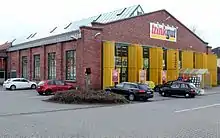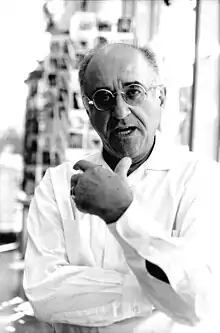Bio's Bahnhof
Bio's Bahnhof (Bio's station) was a music talk show presented by Alfred Biolek on German television from 1978 to 1982. It was produced live with performers of a wide range of music genres in a former railroad depot. Biolek was awarded the Adolf-Grimme-Preis in gold for the series in 1983.
| Bio's Bahnhof | |
|---|---|
 A former railroad depot, location of filming, Frechen, in December 2011 | |
| Genre | Music talk show |
| Presented by | Alfred Biolek |
| Country of origin | Germany |
| Original language | German |
| Production | |
| Production location | Frechen |
| Running time | 90 |
| Release | |
| Original network | ARD (WDR) |
| Original release | 9 February 1978 – 2 October 1982 |
Program

Alfred Biolek tried a new concept in Bio's Bahnhof, which he conceived for the broadcaster WDR in Cologne: a mix of music genres, and an unusual setting in a former industrial site.[1] He collaborated with stage designers Dieter Flimm and Wolf Nöhren. Flimm searched for large halls with an original atmosphere around Cologne, and found a tram depot in Bonn, and a former depot of the Köln-Frechen-Benzelrather Eisenbahn in Frechen, which was chosen.[1][2]
The central idea of Bio's Bahnhof was a mix of many music genres, including pop music, hunting ensemble, classical music and contemporary music such as Karlheinz Stockhausen and Mauricio Kagel. Biolek talked with composers and performers, meeting many representatives of the different styles.[1]
Kate Bush made her first television appearance in the first issue of Bio's Bahnhof.[3] The show also presented dance ensembles, but rarely as they were expensive, compared to individual performers. Sammy Davis, Jr. was available for only 5,000 DM, because Fritz Rau used the appearance as advertisement for his tours.[1] Stars were encouraged to present something unusual, for example a duet of two artists who normally don't perform together; in 1979 Adriano Celentano sang a duet with Elke Sommer, Angelo Branduardi with Esther Ofarim, in 1980 Udo Lindenberg performed with Nana Mouskouri, and in 1982 Mario Adorf with Milva. The American Helen Schneider performed the German traditional "Heidenröslein" in 1978. Biolek, as amateur, sometimes performed with his guest, dancing with Hazy Osterwald and the Kessler-Zwillinge, singing with Caterina Valente and participating in a "clowns" act.[1]
Each show was meant to present one humorous entry, such as comedian Emil Steinberger.[1] The group Folies Parisiennes, of men dressed like Mireille Mathieu and presenting her song "Akropolis Adieu", had to come a second time by popular demand.[1]
In 1982, Biolek decided that he had experimented in enough fields in the show, and wanted to try something else.[1] A later sequel was named Bei Bio (At Bio's). Ten years after the last show, a special edition was aired on 2 October 1992 from the roundhouse of the former producer of locomotives, Orenstein & Koppel in Babelsberg.[4]
Awards
In 1983, Biolek was awarded the Adolf-Grimme-Preis in gold for the series.[5][6]
Episodes
| Episode | Date | Guests |
|---|---|---|
| 1 | 9 February 1978 | Kate Bush, Udo Lindenberg, Vicky Leandros |
| 2 | 6 April 1978 | Helen Schneider |
| 3 | 18 May 1978 | Eberhard Schoener, The Police |
| 4 | 7 September 1978 | Julien Clerc, The King's Singers, Milva, Daniel Sander with Les Folies Parisiennes |
| 5 | 2 November 1978 | The Three Degrees, Eric Delaney, Daniel Sander with Les Folies Parisiennes, Ilse Werner, Herman van Veen, Helmut Zacharias |
| 6 | 28 December 1978 | |
| 7 | 8 March 1979 | Reinhild Hoffmann, Asha Puthli, Konstantin Wecker |
| 8 | 3 May 1979 | Adriano Celentano, Ivan Rebroff, Ludwig Streicher, Elke Sommer |
| 9 | 23 August 1979 | Bernard van Beurden, Angelo Branduardi, Trude Herr, Mircea Krishan, Esther Ofarim, Daniel Sander with Les Folies Parisiennes |
| 10 | 25 October 1979 | Ingrid Caven, Karl Dall, Peter Maffay, Eberhard Schoener |
| 11 | 20 December 1979 | Tim Curry, Marvelli jr., Sylvie Vartan, Gisela Uhlen, Alexis Weissenberg |
| 12 | 7 February 1980 | |
| 13 | 3 April 1980 | Tom Deininger, Elke Koska, Udo Lindenberg, Nana Mouskouri, HA Schult |
| 14 | 15 May 1980 | Marcia Haydée, Al Jarreau, Udo Jürgens, Elke Koska, HA Schult, Felicia Weathers |
| 15 | 31 July 1980 | Edoardo Bennato, Kessler Twins, Hildegard Knef, The Human League, Hazy Osterwald, Bernhard Paul |
| 16 | 25 September 1980 | Anke Engelke, André Heller, Nina Hagen, Klaus Nomi, Jérôme Savary, Alexis Weissenberg |
| 17 | 20 November 1980 | Juliette Greco, Pfuri Gorps & Kniri, Iannis Xenakis, Karl Vibach, Ensemble A Chorus Line of Theater des Westens |
| 18 | 19 February 1981 | Dieter Hallervorden, Biréli Lagrène, Limburger Domsingknaben, Julia Migenes, Joan Orleans, Daniel Sander with Les Folies Parisiennes, Gilbert O'Sullivan |
| 19 | 11 June 1981 | Biermösl Blosn, Ernst Fuchs, Stanisław Sojka, Margot Werner |
| 20 | 20 August 1981 | Deutsch Amerikanische Freundschaft, Julia Migenes, Jacob Sisters, Herman van Veen |
| 21 | 24 September 1981 | |
| 22 | 22 Oktober 1981 | Chi Coltrane, Joachim Fuchsberger, Herbert Grönemeyer, Wendelin Haverkamp, Robert Kreis, Jürgen von der Lippe, Edda Moser, Wolfgang Petersen |
| 23 | 19 November 1981 | |
| 24 | 10 December 1981 | Benny Goodman, Stephan Sulke |
| 25 | 28 January 1982 | Charles Aznavour, José Feliciano, Mülheimer Freiheit (artists group), Rosa von Praunheim |
| 26 | 18 March 1982 | Mario Adorf, Sammy Davis, Jr., Milva, Martha Mödl, Dieter Schnebel |
| 27 | 13 May 1982 | Karan Armstrong, Kid Creole & the Coconuts, Thomas Freitag, Gitte Hænning, Mario Maya, Billy Preston, UKW |
| 28 | 15 July 1982 | Ray Charles |
| 29 | 9 September 1982 | Eisi Gulp, Udo Jürgens, Pepe Lienhard orchestra, Peter Maffay, Miriam Makeba, Tangerine Dream |
| 30 | 28 October 1982 | BAP, Rudi Carrell, Klaus Havenstein, Diether Krebs, Beatrice Richter, Michael Heltau, The King's Singers, Barış Manço, Ivo Pogorelich |
| 31 | 2 October 1992 | Die Prinzen, Thomas Kiessling, Annelie Leutheuser, Heike Förster, Mario Welker und the Brandenburger Symphoniker of the Brandenburger Theater (conductor: Heiko Matthias Förster), Annie Lennox, Nina Hagen, Udo Lindenberg, Die Jelly Rolls, Max Raabe and the Palast Orchester, Mary / Georg Preuße, choir of Leibniz-Gymnasium Potsdam, Regine Hildebrandt, Robert Feldmann, Siegfried Jakob, Wilfried Richter, Reinhard Brinksmeier, Brunhilde Lohberg, Hans Jaekel, Dr. Dietrich Rehbein, Rudolf Röhricht |
Further reading
- Norbert Thomas: Alfred Biolek und sein Bahnhof. (in German) Bertelsmann, München 1982, ISBN 3-570018-63-6
Documentation
- Bahnhof für Bio – Alfred Biolek wird 70. Documentation about the series Bio's Bahnhof with excerpts from the shows and interviews with Biolek, 2004, 100 min., book and direction: Klaus Michael Heinz, moderation: Anke Engelke and Hape Kerkeling, first aired on 10 July 2004 by WDR and NDR
References
- "Bahnhof für Bio- Alfred Biolek wird 70". WDR Fernsehen 2004.
- "Sendung – Bahnhof für Bio am So, 25.07.2021 – WDR Fernsehen". WDR (in German). 25 July 2021. Retrieved 29 July 2021.
- "Interview: Moderator Alfred Biolek über den Coup, Kate Bush ins TV zu bringen". Rolling Stone (in German). 6 December 2011. Retrieved 12 August 2021.
- Bahnen im Rheinland: KFBE: Bio"s Bahnhof (in German) http://www.bahnen-im-rheinland.de, retrieved 18 December 2017
- "Bahnhof für Bio / Zum Tode von Alfred Biolek / Eine Hommage von Klaus Michael Heinz" (in German). WDR. 24 July 2021. Retrieved 29 July 2021.
- "Stadtzauber: interviews". Stadtzauber (in German). 4 July 2012. Retrieved 29 July 2021.